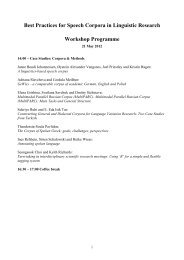96 • 2011 - Hamburger Zentrum für Sprachkorpora - Universität ...
96 • 2011 - Hamburger Zentrum für Sprachkorpora - Universität ...
96 • 2011 - Hamburger Zentrum für Sprachkorpora - Universität ...
You also want an ePaper? Increase the reach of your titles
YUMPU automatically turns print PDFs into web optimized ePapers that Google loves.
Multilingual Resources and Multilingual Applications - Invited Talks<br />
The Multilingual Web: Opportunities, Borders and Visions<br />
Felix Sasaki<br />
DFKI, LT-Lab / Univ. of Applied Sciences Potsdam<br />
Alt-Moabit 91c, 10559 Berlin<br />
E-mail: felix.sasaki@dfki.de<br />
Abstract<br />
The Web is growing more and more in languages other than English, leading to the opportunity of a truly multilingual, global<br />
information space. However, the full potential of multilingual information creation and access across language borders has not yet<br />
been developed. We report about a workshop series and project called “MultilingualWeb” that aims at analyzing borders or “gaps”<br />
within Web technology standardization hindering multilinguality on the Web. MultilingualWeb targets at scientific, industrial and<br />
user communities who need to collaborate closely. We conclude with a first concrete outcome of MultilingualWeb: the upcoming<br />
formation of a cross-community, W3C standardization activity that will close some of the gaps that already have been recognized.<br />
Keywords: Multilinguality, Web, standardization, language technology, metadata<br />
1. Introduction: Missing Links between<br />
Languages on the Web<br />
A recent blog post discussed “Languages of the World<br />
(Wide Web)” 1<br />
. Via impressive visualizations, it showed<br />
the amount of content per language and number of links<br />
between languages. By no surprise English is a dominant<br />
language on the Web, and every other language has a<br />
certain number of links to English web pages.<br />
Nevertheless, the amount of content in many other<br />
languages is continuously and rapidly growing.<br />
Unfortunately, the links between these languages and<br />
links to English are rather few.<br />
What does this mean? First, it demonstrates that English<br />
is a lingua franca on the Web. Users who are not capable<br />
or willing to use this lingua franca cannot communicate<br />
with others and are not part of the global information<br />
society; they are residents of local silos on the Web.<br />
Second, the desire to communicate in one’s own<br />
language is high and is growing.<br />
Several issues need to be resolved to tear down the walls<br />
between language communities on the web. One key<br />
issue is the availability of standardized technologies to<br />
create content in your own language, and to access<br />
1 See<br />
http://googleresearch.blogspot.com/<strong>2011</strong>/07/languages-of-worl<br />
d-wide-web.html<br />
content across languages. The need to resolve this issue<br />
led to the creation of the “MultilingualWeb” project.<br />
2. MultilingualWeb: Overview<br />
MultilingualWeb http://www.multilingualweb.eu/ is an<br />
EU-funded thematic network project exploring standards<br />
and best practices that support the creation, localization<br />
and use of multilingual web-based information. It is lead<br />
by the World Wide Web Consortium (W3C), the major<br />
stakeholder for creating the technological building blocks<br />
of the web. MultilingualWeb encompasses 22<br />
partners http://www.multilingualweb.eu/partners, both<br />
from research and various industries, related to content<br />
creation, localization, various software providers etc. The<br />
project main part is a series of four public workshops, to<br />
discuss what standards and best practices currently exist,<br />
and what gaps need to be filled. The project started in<br />
April 2010; as of writing, two workshops have been held.<br />
They have been of enormous success, in terms of the<br />
number of participants, awareness esp. in social media,<br />
and the outcome of discussions. In the reminder of this<br />
abstract, we will discuss current findings 2<br />
of the project<br />
and will take a look at what the two upcoming workshops<br />
and future projects might bring.<br />
2<br />
More details on the findings can be found in workshop reports<br />
on the project website http://www.multilingualweb.eu .<br />
19



